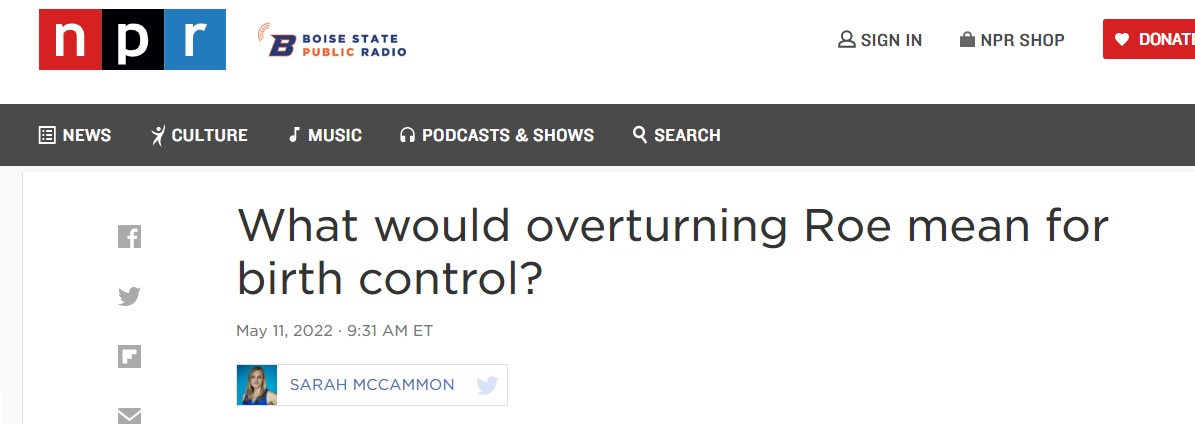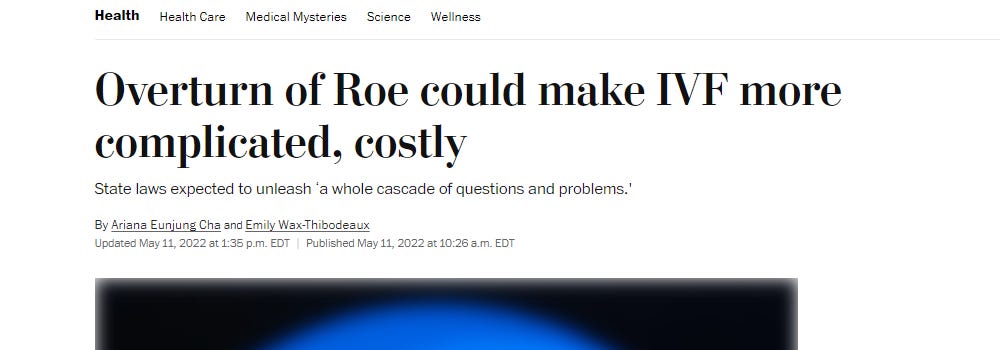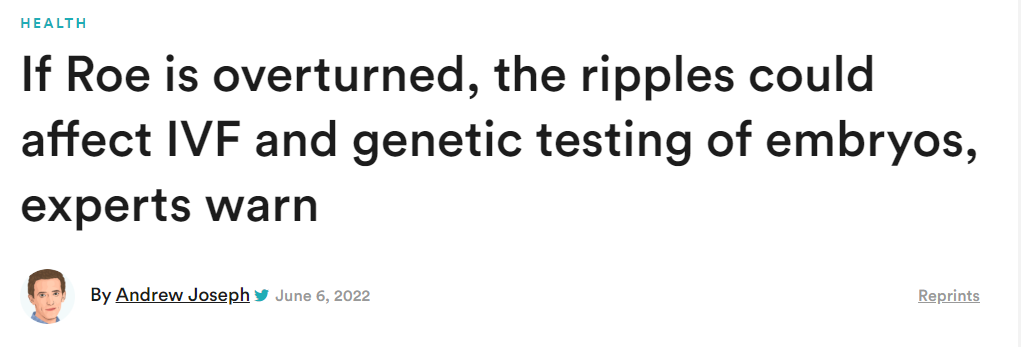The Domino Effect: Roe Falls. What Else Goes?
How the pesky problem of personhood effects contraception, IVF, and embryo donation
Roe is dead.
Today, on the Feast of the Sacred Heart of Jesus, the US Supreme Court has ruled there is not, nor has there ever been, a constitutional right to abortion. The power to legislate on abortion returns to the states.
As abortion advocates and prolifers alike awaited the Dobbs decision with nail-biting anticipation, a flurry of news articles came out positing the possible domino effects of overturning Roe v. Wade. At least 26 states have laws that were set to go into effect to limit abortion. Many of these laws are based on the idea that the personhood of a human being, and thus his human rights, begin at conception.
As the journalists point out, defining human life in this way has serious implications for many of the practices we’ve come to accept in the wake of legalized abortion. If an embryo is a person, it might be problematic to freeze him indefinitely, donate him to science, or simply thaw him out when he is no longer desired. If life begins at conception, Plan B ends that life.
A quick sampling of the headlines is enough to reveal the not-so-subtle argument being made in the media: we cannot overturn Roe because doing so is problematic for many practices we’ve come to accept.
This narrative is problematic. First, it assumes too much. While many of the laws set to limit abortion do so on the basis of the personhood of the fetus, few if any explicitly address any other issue. If lawmakers wanted to create additional limits surrounding the thawing and freezing of embryos, for example, that would entail an entirely separate legal process. These headlines are alarmist propaganda that serve to rouse people emotionally while distracting from the actual substance of the decision: that states are left once again to govern themselves on the issue of abortion.
On the other hand, the headlines serve to highlight the ways in which our complacency about abortion has contributed to other violations of human dignity becoming embedded in our society.
And while the authors of these articles are arguing that we must deny that life begins at conception so that we can save these practices, the argument can just as easily (and more rationally) go the other way: if life begins at conception, we ought to be rethinking these practices. So, thank you, secular orthodoxy, for raising the following issues:
Hormonal Contraceptives
As I argued in May, hormonal contraceptives are universally abortifacient — if one defines abortion as intentionally ending a human life that begins at fertilization. Individuals who take seriously the idea that life begins at conception ought to seriously consider the ramifications of using hormonal contraceptives for the potential lives they might conceive.
Do I think it’s likely that lawmakers are going to crack down on contraceptives for these reasons? Hardly. I also don’t think that’s an appropriate response. One can consider an act to be gravely wrong and at the same time believe it inappropriate for the state to make that act illegal. I think there is very little chance that lawmakers come after contraception in any meaningful way.
The one “exception”?
Plan B.
Because, let’s be serious, Plan B/the Morning After Pill/Emergency “contraception” is a misnomer. This one is just straight up abortion in sheep’s clothing. (Although, unsurprisingly, Planned Parenthood sees it differently).
Miscarriage
This one stems from the fact that the medical coding for what is sometimes a medically necessary following a miscarriage, a D&C, is also used following an abortion. The idea that anyone wants to prosecute women for having a miscarriage is absurd.
That being said, there are complicated medical cases in which early delivery might be necessary to preserve the life of the mother. Early delivery should not be confused, as it is here and here, with intentionally ending the life of the fetus — even when, in some cases, that early delivery necessarily occurs prior to viability.
Need a litmus test? What happens to the body after it emerges from its mother? If everything possible is done to preserve the life of the baby upon delivery, that’s not an abortion. If the fetal remains are sucked into a tube, tossed in with the medical waste, or sold for experimentation, it’s fairly safe to say that the death of the fetus was intended outcome of the procedure.
Abortion for Minors
Thank God.
In Vitro Fertilization
Of all of the concerns being raised, those that arise within the area of IVF are the most complex and might genuinely warrant all the buzz. Again, lawmakers would have to initiate separate legislation to address these issues, and I believe that they ought to. Here are some of the ways that the pesky personhood of embryos causes hiccups for IVF as it is currently practiced:
“Selective reduction”
Most obviously, laws that prohibit abortion will interfere with the “selective reduction” that is often standard practice in IVF. After couples spend great sums of money for fertility doctors to extract eggs and fertilize embryos, it makes more sense economically that they attempt implantation of multiple embryos at once. If the number that successfully implant is too high, doctors recommend “selective reduction”: aborting to reach a more reasonable level of fetuses for the purposes of making the pregnancy safer for mom and the lucky embryos who survive the culling.
So, the alarmists are right about this one. If doctors are not permitted to abort excess siblings, then they will be forced to implant fewer embryos to begin with, likely making IVF both less successful and more expensive. Incidentally, this is the way many Christian couples have chosen to practice IVF all along, a sort of “prolife” IVF for churches who recognize the personhood of the embryos but don’t share the Catholic Church’s other moral objections to the practice.
Genetic testing
One of the nasty aspects of IVF is the genetic testing on and disposal of “defective” embryos. Many of the articles that have been published in the last month raise eugenic concerns that couples might be “forced” to carry and raise defective fetuses if they can’t simply be tossed. What are we to do?
Realistically, the laws on the books almost always define “abortion” as ending a life in the context of terminating a pregnancy. Disposing of embryos represents a different sort of act legally, even if morally speaking, the effect is equivalent.
This whole area of the crossover between IVF and eugenics is worth revisiting. As people of faith, as a society, as a Church, we need to think deeply together about the implications of selecting who qualifies for life on the basis of their genetics. This comes up in multiple conversations during Season 1 of the podcast. It has already come up in certain legislation banning the bringing to life of “defective” persons, and, conversely, has come up for couples, usually disabled themselves, wishing to reproduce similarly disabled children intentionally.
This is a conversation that needs to be ongoing, especially as embryos begin to gain the recognition of their rights that they deserve.
The “Leftovers”
Again, as a function of economics, it makes more financial sense to produce a larger number of embryos than the number of children a family desires to raise. This has resulted in large numbers of frozen embryos waiting in limbo to be implanted or discarded at the will of their parents. Parents often pay a storage fee (although no fee can totally protect against the accidental thawing of their “potential” children). There are also custody battles, inheritance issues, and the question of whether to reproduce using the embryo of a dead spouse.
The freezing of an embryo itself is, as the Magisterium teaches, an affront to the dignity of the person, alive yet not living, in suspended animation. These embryos remain in “a situation of injustice which in fact cannot be resolved.”
Embryo Donation
One prolife attempt to save these embryos from their fate is referred to as embryo adoption or donation. Frozen embryos can be offered to “adoptive” families who then use IVF to give them a chance to develop. Successful “donations” have resulted in live births after as many as 27 years of being frozen, born of a mother who was herself born just a year before her daughter was conceived.
In the debate over whether it is more appropriate to describe this process as “adoption” or “donation,” laws that recognize the personhood of the embryo make things more clear. One cannot “donate” a child in the same way one donates an outdated pair of socks. Of course, if one can adopt a child as easily as one accepts a donation, that situation poses its own perils.
For further reflection on this practice, the Church’s stance, and whether “adopting” these embryos might qualify as “rescuing” them, check out Dr. Charlie Camosy’s interview at The Pillar.
Embryonic Research
The media has been curiously silent on this one. Perhaps journalists consider it to be less than engaging emotionally. Perhaps they don’t want to risk raising further ire over what has quietly become an embedded part of scientific research. In any case, embryonic research is alive and well, despite the availability of pluripotent adult stem cells as an alternative without the same ethical barriers.
Of course, if personhood begins at conception, that has some troubling implications for researchers who create, dissect, and destroy embryos for research. In any case, this is something we ought to be fighting back against. At the very least, we can advocate for labeling on medical treatments that disclose testing on human embryos. If the cosmetic industry can be “cruelty free” by avoiding animal testing, why can’t medicine be “cruelty free” by avoiding testing on nascent human life?
What are your thoughts on the overturn of Roe? How do you see it impacting these and other accepted practices in American society?
What, if anything, is the Church’s role in all of this?
I look forward to reading your comments in our discussion.
Books: Mama Prays | Reclaiming Motherhood from a Culture Gone Mad
Connect: Instagram | Facebook | Twitter
Podcasts: Brave New Us | Mama Prays
Website: www.SNStephenson.com









